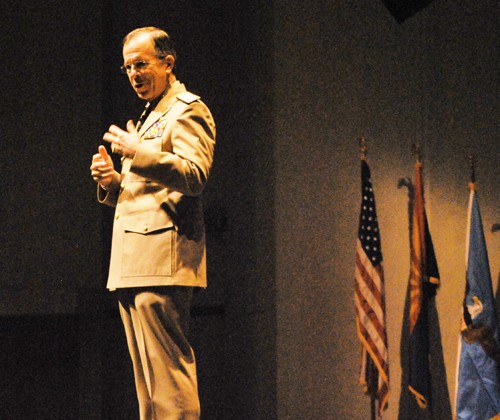Arizonans were urged to continue supporting military personnel by the chairman of the Joint Chiefs of Staff on Friday.
“”I have been doing this a long time, and I would tell you that when I came in, in the late ’60s certainly the atmosphere on campuses is not what it is now when I returned to them, and I remember that,”” said Adm. Michael G. Mullen, the top military adviser to the president, at a town hall-style meeting in Centennial Hall on Friday.
Mullen lauded changes made to military policy over the last decade, a result of the wars in Iraq and Afghanistan.
“”I believe we have a changed military, I think we have a changed nation … and the pace of change is staggering,”” Mullen said. “”So we’ve changed who we are, we’ve changed how we fight, we’ve changed where we go, we’ve changed what we do.””
Mullen also praised the support the public has shown for returning veterans, citing the difference from when he returned from Vietnam.
“”I am incredibly impressed … it is the support across that the country for the men and women who have served has just been remarkable,”” Mullen said. “”And again, I was there at a time, I started at a time when that was not the case.””
Mullen stressed the role of local leaders in determining effective policy for returning veterans.
“”It takes local leaders. It takes leaders at every level, but certainly what I would hope to do over the course of the day here in Tucson is connect with local leaders who are very much focused on making a difference in their community,”” Mullen said. “”Looking at this as an opportunity for the community, and I really believe it is, but making that connection and leading it and shaping it here in Tucson for Tucson’s needs, Tucson’s future.””
After his prepared remarks, Mullen took questions from the audience. One man, who did not give his name, asked Mullen how he expected to win wars in Afghanistan and Iraq when applying the “”just war”” theory, which forbids preemptive strikes and killing civilians.
“”Fundamentally the way we are deploying forces right now, we can win any tactical situation, kinetically,”” Mullen said. “”And the more civilians we kill, the more we lose strategically and the end of that is we lose from my perspective.””
Mullen said that tactical changes are necessary to address changes in the way warfare is conducted.
“”Strategically, you can’t go into a country and keep killing the men and women and their kids who live there and expect to gain their support, not gonna happen,”” Mullen said to a round of applause. “”If we don’t get the support of the Afghan people or the Iraqi people … we can’t win, if we do we can.””
Mullen was questioned on the national security ramifications of climate change and said the military is making an effort to transition toward more sustainable practices.
“”We are much more focused now on a future that has, in our world, green technology, and a green approach specifically,”” Mullen said. “”That is not something, as it is for the country, we can throw a light switch and transition overnight.””
Several groups, including the UA chapter of No More Deaths/No Mas Muertes and UA Students for Justice in Palestine, protested Mullen’s policies and continued U.S. presence in the Middle East before and after the event. About 20 to 30 people attended the protest.
Brooke Lober, a doctoral student in gender and women’s studies and a representative for No More Deaths, attended the protest.
“”I think it’s good to continue representing opposition to the military industrial complex when the military decides to hold these kind of PR events on college campuses,”” Lober said. “”As a university we need to take a look at our corporate and military investments and see whether they preclude or exclude democratic debate.””









